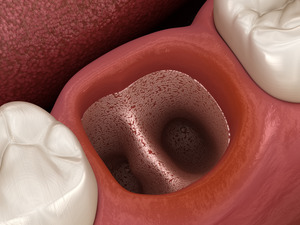
You may have heard that a dry socket can sometimes occur after a tooth extraction. This condition is known to cause severe discomfort, and it can significantly delay the healing process. But just how worried do you need to be about a dry socket? Is it all that likely to occur in the first place? And is there anything you can do to minimize the chances of experiencing one? Here’s what you need to know to ensure a smooth healing process.
What Causes a Dry Socket?
When a tooth is removed, a blood clot forms at the site where it used to be. The purpose of this blood clot is to keep the now-exposed bone and nerve endings safe while your mouth is healing. However, if the blood clot fails to form, is dislodged, or breaks down prematurely, the underlying bone will be left exposed, resulting in a dry socket.
How Likely is a Dry Socket?
The good news is that experiencing a dry socket after having a tooth removed is actually relatively rare. Only about 2% to 5% of tooth extraction patients end up suffering from this condition. However, just because the chances of the issue happening are low doesn’t mean that you shouldn’t take precautions against it. To make sure everything goes as planned after your extraction, it’s best to take whatever steps you can to avoid a dry socket.
How Can You Prevent a Dry Socket?
The following steps can go a long way toward making a dry socket significantly less likely to occur:
- Do not drink anything through a straw. The suction could easily end up dislodging the blood clot.
- Do not spit. If there’s too much saliva in your mouth, simply swallow it.
- When brushing your teeth, avoid making direct contact with the extraction site.
- Stay away from warm or hot drinks while your mouth is recovering. Such beverages can cause your blood vessels to widen, which can result in your blood clot dissolving or becoming dislodged.
What if a Dry Socket Does Occur?
If you do end up experiencing a dry socket, it’s important to stay calm and deal with the situation appropriately. Your first move should be to call your dentist to schedule an appointment so that they can develop an appropriate plan for treating it. In the meantime, you should be able to use an over-the-counter pain reliever to keep your discomfort under control.
In short, you shouldn’t let the fear of a dry socket prevent you from having a necessary tooth extraction performed. Not only is the condition uncommon, but there are measures you can take to prevent it from happening. And if it does occur, you can count on your dentist to take whatever steps are necessary to stop your pain and get the recovery process back on track!
About the Author
Dr. Farshad Bakhtyari – also known as Dr. B to his patients – earned his dental degree at Boston University. Thanks to his Advanced Education in General Dentistry residency, he has been trained to provide high-quality dental care for people of all ages. His Herndon practice, Premier Dental Care, offers tooth extractions for patients with badly infected or damaged teeth. If you think that you need to have a tooth removed, you can schedule a consultation with Dr. B by visiting his website or calling (703) 860-8860.

